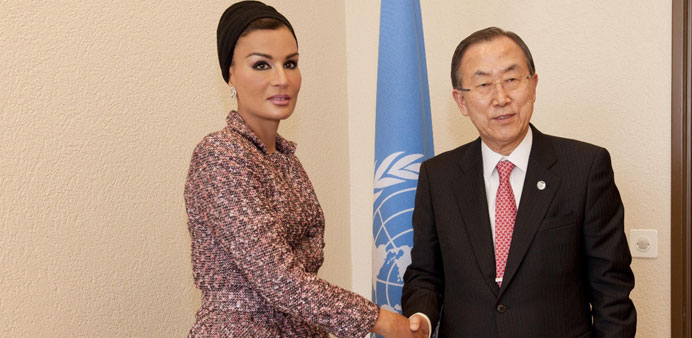HH Sheikha Moza bint Nasser with UN Secretary-General Ban Ki-moon in Geneva. PICTURE: Maher Attar/ HHOPL
QNA/Geneva
HH Sheikha Moza bint Nasser has called for stepping up efforts to achieve the UN Millennium Development Goals.
Speaking at the Human Rights Council High-Level Panel at the UN headquarters in Geneva which was also attended by UN Secretary-General Ban Ki-moon, Sheikha Moza said the UN chief has the challenge of seeking global agreement on a vision for a sustainable future, noting that the scale of this task is immense, but so is the scale of the problems that still plague the world today.
“Our discussion can bring a valuable contribution to the process. We are not starting from scratch. The Millennium Development Goals are still unfinished business and we must complete them,” HH Sheikha Moza underlined.
“We must build on their simplicity, on their measurability. We must use them as a platform towards true sustainability,” she added.
Sheikha Moza underlined that the development goals must be made enforceable, equal and universal, by making the principles of human rights clearly visible throughout them.
These human rights, enshrined in the Universal Declaration have, for 60 years, been a credible and respected deterrent to violators, she said.
Sheikha Moza said that strengthening the human rights dimension in the development goals is the best way to ensure that these goals will also be enforceable. An accountability mechanism, similar to the Universal Periodic Review, would reduce the scope for violations, by drawing scrutiny from the global community - not only over a country’s human rights record, but also its commitment to human development for all. Enshrining the principle of universality in this way would help eliminate discrimination in access to education, and ensure that all groups in society are reached.
“That is why it is now so important that we uphold this principle of universality in the Universal Periodic Review,” Sheikha Moza said.
She urged the Council to use all appropriate measures to ensure that this Review continues to be an equal process.
Crucially, Moza said, combining human rights and development will bring mutually-reinforcing benefits. The MDGs are one of the most ambitious programmes in the history of the UN. Many lessons can be drawn for the future framework.
Associating human rights goals with development targets will bring clarity on human rights definitions. There should be no more room for ambiguity, misconception or cultural relativism. It will also help to make progress in human rights more measurable, by linking to clear and defined development targets, she added.
“It will allow us to measure the impact of the right of every child to have an education and to measure the economic and social benefits of realising that right. It will help us assess the damage to a society when that right is taken away by conflict, disaster or even prejudice,” Sheikha Moza said.
Indeed, placing human rights as an umbrella for the development targets will make the human rights framework more operational and the development targets more enforceable, she underlined.
“In looking ahead, we must not get distracted from our obligations to the MDGs, but work harder to find innovative ways to achieve them.
“For example, we can - and must - do more now to support each and every child to have access to schooling, regardless of race, faith, language or any other factor,” Sheikha Moza said.
It is unacceptable that education continues to be a victim of conflict, Sheikha Moza stressed, pointing out to the example of Gaza, where the impact of the blockade continues to have a crippling effect, especially on education. Schools have been damaged. Supplies, from chairs to textbooks and pencils cannot get in.
Since 2009, the Al Fakhoora programme has been working with the UNDP to enable young people to pursue higher education, helping to reconstruct education buildings and providing psycho-social support, Sheikha Moza noted.
It is seeking to address some of the damage caused by the same country that is trying now to escape scrutiny of its human rights record through the Universal Periodic Review, she added.

